Argentina Lake District
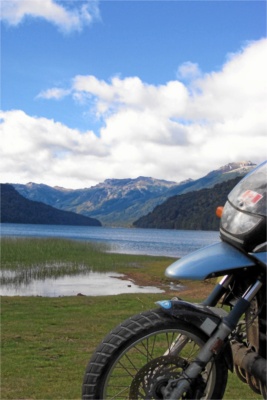
Our ride across the northern part of the Patagonian region was fun. The morning started pretty chilly and as we traveled across the wide open terrain the wind increased in speed. After three hours of leaning into the wind to ride in a straight line the low temperatures started to turn our hands and feet numb. We kept hoping that a restaurant or gas station would appear on the horizon to give us somewhere to warm up out of the wind. Eventually we found shelter from the wind in the ditch at the side of the road. Not as comfortable as sitting in a coffee shop sipping a steaming cup of tea, but it got us out of "el viento."
When the circulation had returned to our extremities we climbed out of the ditch and continued to Junin de Los Andes. Junin is one of the towns in Agentina's Lake District known for trout and beautiful scenery. After leaving the wide open windy Patagonia, we had enjoyed the scenic ride through the hills and now it was time to warm up in a good restaurant and enjoy some fresh trout.
At the edge of town, overlooking the Chehuemin River was a Bed & Breakfast with...heat! We checked into our room and looked out the window to enjoy the view of the river as we stood beside the heater warming ourselves. Later we walked around town looking at the homes and stopped at the grocery store to buy supper. On the walk back to our room another couple rode into the parking lot on their motorcycle. Chris and Sue, from England invited us to their room later that evening to share motorcycle travel stories and enjoy the warmth of the fireplace in their sitting room. Before leaving Junin we stopped at Via de Cristi, a series of beautiful scuptures that are interpetations from the life of Christ. It was on a hillside overlooking the the village.
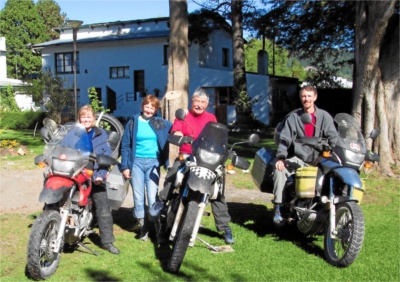
Deb, Sue, Chris and David
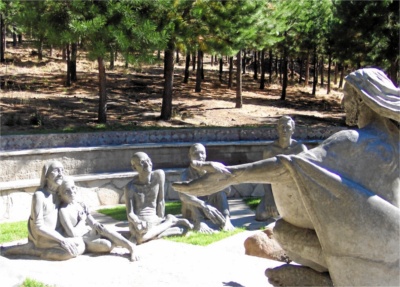
Via de Cristi in Junin de los Andes, Argentina
The next morning we continued 25 miles through the Seven Lakes Area to the town of San Martin de Los Andes, then the following day 70 miles of twisty roads that followed the Route of Seven Lakes that eventually took us to the town of Villa La Angostura. Sue had recommended staying at Verena's Haus in La Angostura, and we enjoyed the comfortable room and a great breakfast. The next day we took a boat to the end of a peninsula in Arranyes National Park and hiked through the woods the 7 miles back to the marina, then another 2 miles back to town.
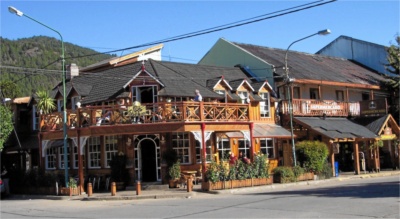
San Martin de los Andes, Argentina
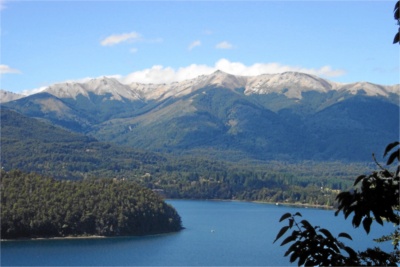
Villa La Angostura, Argentina
We had left Chile two weeks ago after only four days, as it is a relatively expensive country when compared to the rest of South America. Now that we were farther south, we wanted to go back to Chile to see the Pacific Ocean again and the island of Chiloe. There goes are budget, but we figured we had traveled 20,000 miles (32,000 kilometers) so far so we may as well just do it - of course that also meant more meals from the grocery store, but that is okay because Deb makes an excellent cheese and cracker dinner and an even better sliced apple for desert.
The customs and immigration offices for Argentina and Chile are each about 30 kilometers from the border, with a smooth paved road running through the mountains joining the two countries. After crossing the border, we rode straight west through the town of Osorno, Chile and out to the coast to the tiny fishing community of Bahia Mansa. As we got closer to the Pacific the road climbed and Dave got curious as to how high we had to climb to get to sea level, assuming that the Pacific Ocean was still at sea level. Cresting the last hill gave us a birds eye view of the bay, the house and the small yellow fishing boats bobbing in the surf. We followed the pavement down hill until its end right on the pier. Turning to face each other we both said, "Well, looks like the end of the road."
We noticed a complete lack of hotels or hostels in town. We still stood looking out across the bay when a fisherman walked over to see what brought strangers into town. He told us to ride back up the hill and take the dirt road over to the next bay where we would find a hostel. The scene as we started down the hill on the other side of the ridge gave a very picturesque view of a string of homes along a beach, a small river and cluster of buildings along the far side of the river. The hostel we found was not much from the outside, but it appeared to be the only place in town.
We road up the steep driveway, past the gardener chopping ivy off the rock wall with a machete. Deb was not impressed by the place with it's peeling paint giving it a forlorn look, but Dave talked to the gardener and asked if there was a room available, how much it was and if he could see it. He came down the stairs with a smile on his face and told Deb she we be surprised. The home was spotless on the inside and our room had a large window with a panoramic view of the beach with large waves crashing over the black volcanic rocks near shore. After unloading the bikes Deb sat on a bench to watch the surf and Dave did some maintenance on the bikes while being watched by the gardener, four dogs and two cats. When the work was done the gardener went back to his chopping and Deb came over to watch Dave walking in circles around his bike muttering to himself. After quite a bit of searching and not wanting to believe the gardener would have taken one of his wrenches, Dave walked to the tool shed where the gardener had gone to sharpen his machete. Right near the doorway was the wrench. Did the guy try to steal it and dropped it on the way to shed. Deb though Dave was losing his mind, but Dave knew he had not walked near where the wrench lay. Deb then nodded toward one of the dogs, who was picking up a screw driver from beside the bike. So Dave wasn't losing it and the gardener wasn't a thief, it was the mischievous little dog!
Later we asked the gardener, who we had now figured out was also the owner, and maid, where the market was in town. He pointed along the beach and said follow the road. We walked south down the dirt road the ran along shore toward the cluster of buildings on the other side of the river. We walked about 30 minutes to find two small shops where we could buy some buns, tomatoes and bananas. One of the dogs from the hostel followed us to the shops and waited outside for us and two more dogs followed us back to the hostel only being distracted once to chase a pig that came out to see us. Doctor Doolittle would love this little town.
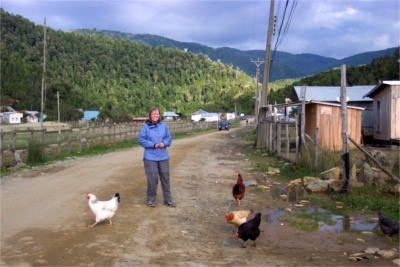
Road to the grocery store in Maiculpe, Chile
When we returned to the hostel, the owner/gardener/maid asked us if we would like supper. We looked at our small bag of groceries and asked what was available. Empanadas was our choice and that would not be available until 8:30 pm so we agreed to that and dove into our groceries to hold us over until then. At 8:30 we found out the owner/gardener/maid was also the cook and babysitter as he was looking after his grandson. Over supper Deb guessed that the hotel owner might be a former fisherman, and was used to swabbing the decks, that is why the place was so spotless, though Dave though he did pretty well as a cook, judging by the empanadas and held his own as a gardener if you looked at his flowers. What we couldn't figure out was how he could make a living running a hotel where we appear to be the only tourists to show up in quite a while, and we got here by accident as this town and the road to it were not even on the map.
Osorno Volcano is a picturesque volcano on the shore of Lake Llanquihue. We could see it in the distance as we enjoyed the sunny morning. After we decided to take the long way around the lake on the dirt road, the clouds started to roll in and obscure the glacier covered peak. By the time we had ridden past the base of the volcano and around to the far side of the lake the clouds cleared again and treated us to a picture perfect view of the lake and volcano. We spent the night in the town of Puerto Varas on the south shore of the lake. We stayed in a hostel run by a German man. It was very tidy but had too many rules for our liking. For example, there was a sign on the wall in the bathroom indicating that men were supposed to pee sitting down.
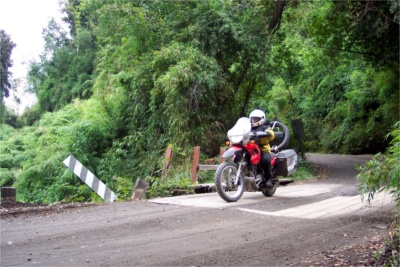
Road around Lake Llanquihue, Chile
We left Puerto Varas under threatening skies. Not ten minutes after we left, it started to rain. We were heading further south to the island of Chiloe. The ferry ride to the island was not the same as the ferry we took in Bolivia. This was large, was not powered by an outboard motor, and actually had ramps at both ends allowing an easy drive-on-drive-off passage. It rained the throughout the 30 minute transit and for the next 20 miles until we reached the town of Ancud. Our waterproof gear isn't very waterproof anymore so we were cold and wet. Luckily we had our electric vests and gloves to keep us from freezing solid in the wind. We stopped to have lunch and thaw out in a restaurant with a wood fire stove. Later we found a place to stay that was supposed to have heat but evidently they didn't put enough logs on the fire under the boiler because our room was freezing. In spite of that we had a great room with huge windows on both the west and south sides and could watch the storms blow in from the Pacific.
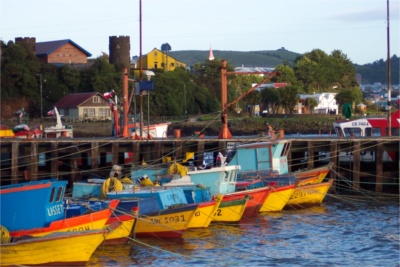
Ancud harbour, Chiloe Island
We had better luck with the weather the next day and spent it exploring the island which is made up of rolling hills, rugged coastlines, farmers and fishermen. We explored several sea-side villages before heading back to the mainland of Chile.
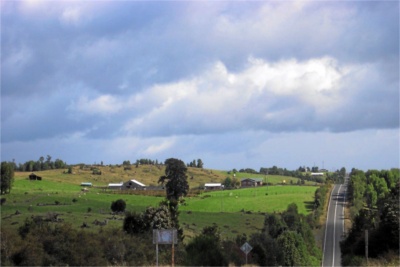
Chiloe Island
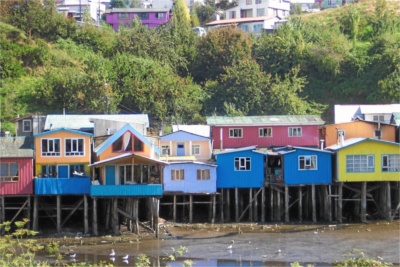
Castro, Chiloe Island
In the town of Frutillar, on the west side of Lake Llanguihue, we found a Bed and Breakfast run by a very sweet older lady. It was just like staying at grandma's house. She gave us the attic room which was very large, had sloped ceilings and a beautiful view of the volcano across the lake. She was always busy baking cakes for her 'kuchen' shop in front of the house. She did our laundry for us and when we asked how much it was, she said 2,000 pesos but if we thought this was too much, then we could just pay 1,000. Since it was an awfully large load of laundry, we paid 2,000 pesos (about $ 4).
The following day was another excellent day for riding as we crossed the border back into Argentina and through more of the Lake District to the town of Bariloche. We were very excited to finally arrive in Bariloche as early in our travels, whenever we mentioned Bariloche, people told us we would love it, and we did! It seems like an almost perfect place. Gorgeous blue lakes, dramatic mountains, twisty roads made for riding, fabulous skiing, hiking, rock climbing, sailing or just sitting in a cafe watching the beautiful world go by.
Horacio, a young man that grew up in Bariloche, noticed a Canadian flag sticker on Dave's bike when it was parked in front of the hostel we were checking into. He came over to ask us about our trip and we found out he was a ski instructor in British Colombia for a season. The next day Horacio dropped by our hostel and invited us to his home for an authentic Argentine asado. Argentina is know for its beef. An asado is like a giant barbecue of several types of meat. While Horacio got the fire going in the grill, Deb prepared the salad and Dave just stood by to supervise. We talked and ate for hours until we were ready to burst.
The Lake District lived up to our expectations.
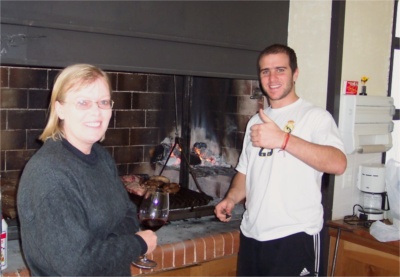
Horacio and Deb
